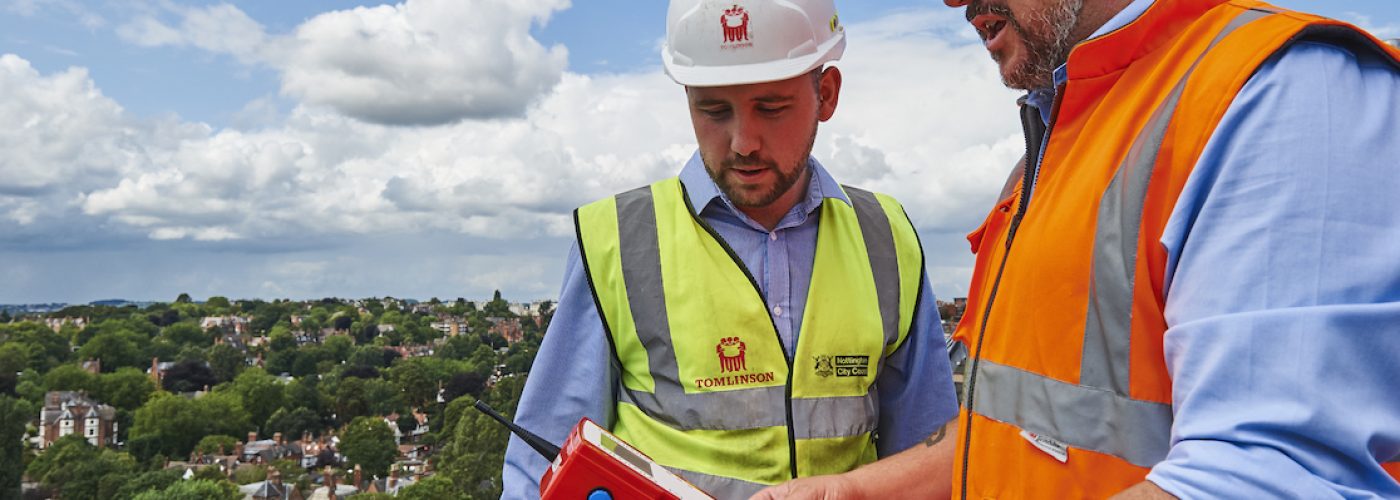MAY MEANS CONSTRUCTION SAFETY

THIS MAY, Construction Safety Week will join global businesses from across the sector to inspire everyone in the industry to be leaders in safety. James Pecz, global solutions marketing manager at Ramtech, discusses how technology is helping to support the construction industry to raise fire safety standards.
The first week of May plays host to some of the biggest events and awareness weeks for the construction sector, including Construction Safety Week 2022 (2 – 6 May) and the UK’s largest construction event UK Construction Week’ (3 – 5 May). With the spotlight firmly on the sector, it is a good opportunity to review the importance of continued progress and excellence in construction. A big part of this success is reliant on safety, which should underpin everything.
Ensuring that all construction workers can return home safely and that under construction sites are well protected – from start to project completion – is paramount. At Ramtech, Internet of Things (IoT) wireless technology plays a key role in our approach to keeping construction sites safe. While there are many different safety risks on a site, our work for the construction industry primarily focuses on temporary fire safety and security solutions.
Fire protection
Busy workers on construction sites operating machinery are often close to sources of ignition, such as highly combustible materials and solvents. On top of this, fire could also happen during the construction phase as open sites are often more vulnerable to theft, vandalism, and arson. Further adding to this risk is the fact that typical building protection systems such as sprinklers, fire walls and wired detectors are not always in place until the final stages of construction. These issues are not unique to just one area and the global construction industry all face the threat of fire.
Taking global action
The common risk of fire means that as a sector we should all be raising standards by utilising the technology available to us. Relying on manual and outdated methods, such as using an air horn or shouting to raise the alarm is still a concern.
In the US, many sites still choose to use air horns as an evacuation method on construction sites. However, this does come with disadvantages. Namely, an air horn cannot provide site-wide evacuation as it isn’t able to tell you where the fire is located, merely that there is a fire somewhere on the site. It can also be hard to distinguish the noise of an air horn above other background sounds on a site.
Similarly, the UK Health and Safety Executive (HSE) still advises that ‘on small low risk sites the alarm may be raised by shouting’. The HSE does advise that ‘on high risk or larger sites a fixed and interconnected system (wired in or wireless) of call points and sounders will be required to provide an effective warning system’. Typically, a wired solution is usually the best form of protection on a completed site, due to the layout of the building being fixed and the access to power sorted. For construction sites that are constantly changing and that also do not have a reliable power source yet, the ability to have a flexible fire alarm solution that does not rely on a fixed location and can be moved or added to as needed is the ideal solution.
Wireless solutions and IoT
When considering the best ways to protect construction sites, it makes sense to use the best that technology has to offer. Our world is more connected than ever before, and this has helped to influence the next generation of wireless connected solutions. In fact, the IoT spans nearly 100 billion physical objects allowing them to communicate with each other. Due to this progress, wireless fire alarm systems have advanced greatly over the past few decades. Take our fully EN54-25 compliant WES3 24/7 fire alarm monitoring system for example; it can connect to our REACT platform, which is a cloud-based solution that raises alerts in real time, and is sent straight to the people who can act on them via a simple to use mobile app.
Because the protection offered by technology like the WES3 is constant, this means that no matter the time or place the fire can be detected and communicated to personnel via the use of secure radio frequencies. With an unlimited number of units able to be used per site, more units can be added as the build progresses. Repeater units ensure the signal gets a boost on especially large sites. An emergency signal can be triggered automatically or manually from anywhere. This is all possible without wires or cables and without having to rely on the presence of workers to detect and extinguish fires.
Technology like this is a gamechanger for the construction industry and will reduce risk and prevent incidents from occurring. As we consider how to better protect the safety of our sites from the risk of fire, I urge global professionals who are coming together in the name of construction safety and awareness this May to think carefully and look to embrace technology in a bid to raise industry safety standards.
For more information about Ramtech’s construction solutions, please visit www.ramtechglobal.com





